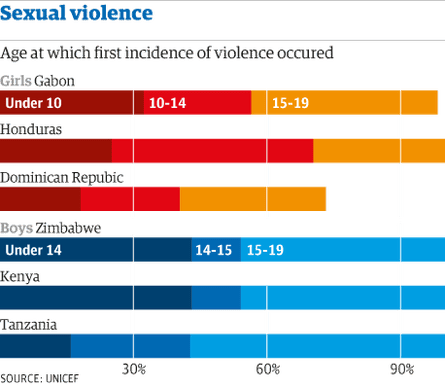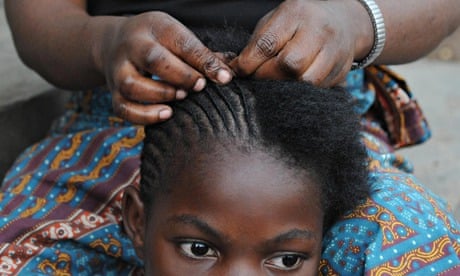About one in 10 girls around the world experiences serious sexual violence, the UN children's agency has said in a major report detailing the "staggering extent" of sexual, physical and emotional abuse faced by young people.
The Unicef report found that 120 million girls and female adolescents under 20 had endured rape or other forced sexual acts, with such experiences especially common in some developing countries – about 70% of girls suffer sexual violence in the Democratic Republic of the Congo and Equatorial Guinea, and an estimated 50% in Uganda, Tanzania and Zimbabwe, Unicef said.
The report also pointed to problems in richer countries, with many girls reporting "sexual victimisation", for example, by harassment or exposure to pornography.
Many young victims did not report abuse, the authors found, with data showing that nearly half of all girls aged 15-19 who said they had faced physical and/or sexual violence had never told anyone about it.
The report also highlighted the high numbers of young people murdered every year, totalling about 95,000 deaths in 2012. In some countries, for example Panama, Venezuela, Brazil and Colombia, murder is the leading cause of death for males aged 10-20. Nigeria alone had 13,000 child and adolescent homicides in 2012, with some 11,000 in Brazil.
More widely, the researchers found the widespread use of violent forms of discipline against even very young children; a significant problem of violent bullying by peers; and very divergent views on physical and sexual abuse.
Violence against children occurred "every day, everywhere", said Anthony Lake, Unicef's executive director. "And while it harms individual children the most, it also tears at the fabric of society, undermining stability and progress. But violence against children is not inevitable. It is preventable, if we refuse to let violence remain in the shadows."
Of the findings in the report, Lake said: "These are uncomfortable facts – no government or parent will want to see them. But unless we confront the reality each infuriating statistic represents – the life of a child whose right to a safe, protected childhood has been violated – we will never change the mindset that violence against children is normal and permissible. It is neither."

The report, Hidden in Plain Sight, takes in data from 190 countries. On sexual violence, it identifies a particular problem with countries in sub-Saharan Africa: more than 10% of all girls in 13 of the 18 states for which there is data report being forced to have sex. Sexual violence against girls takes place mostly in adolescence, but in many of these countries at least one in five girls reports suffering sexual abuse between 10 and 14.
The research uncovered some troubling attitudes towards child sex abuse. It notes as an example a large-scale survey in six eastern Caribbean states which found that a majority of people did not think male attitudes towards women was a cause of such abuse, while three-quarters thought the way a girl dressed could draw sexual attention. Elsewhere, a Norwegian study pointed to apparent public uncertainty about whether sexual contact with children was damaging.
Conversely, the authors found little support for the physical punishment of children given the sometimes endemic use of violence as a means of discipline. In only one country, Swaziland, was the proportion of adults who believed in the physical punishment of children higher than the actual percentage of children subjected to it.
In contrast, the report concludes that about a billion children aged two to 14 – six in 10 of the total – are regularly subjected to physical punishment. For the most part, this is a mixture of what the authors described as lesser physical violence and "psychological aggression", but in 23 countries, it notes, severe punishment, such as striking a child on the head, ears or face, or hitting them hard and repeatedly, is faced by more than 20% of children.
As children get older they often face violent bullying from their peers, especially boys, the research finds, with more than one in three 13- to 15-year-olds worldwide reporting regular bullying. Among 106 countries with comparable data, adolescent bullying rates ranged from 7% in Tajikistan to 74% in Samoa. On a parallel note, almost a third of teenagers in Europe and North America admitted bullying others.
The authors stress that attitudes towards violence and sexual abuse play a key role in discovering why they are so prevalent: "The evidence in this report suggests that close to half of all girls aged 15 to 19 worldwide (about 126 million) think a husband or partner is sometimes justified in hitting or beating his wife (or partner). In sub-Saharan Africa and the Middle East and north Africa, this proportion rises to more than half."
It adds that "supportive attitudes towards wife-beating" are also widespread in adolescent boys, with about half in eastern and southern Africa and South Asia believing a husband is justified in hitting his wife under certain circumstances.
They conclude: "While often regarded as an individual problem, violence against children is, in fact, a societal problem, driven by economic and social inequities and poor education standards. It is fuelled by social norms that condone violence as an acceptable way to resolve conflicts, sanction adult domination over children and encourage discrimination."
